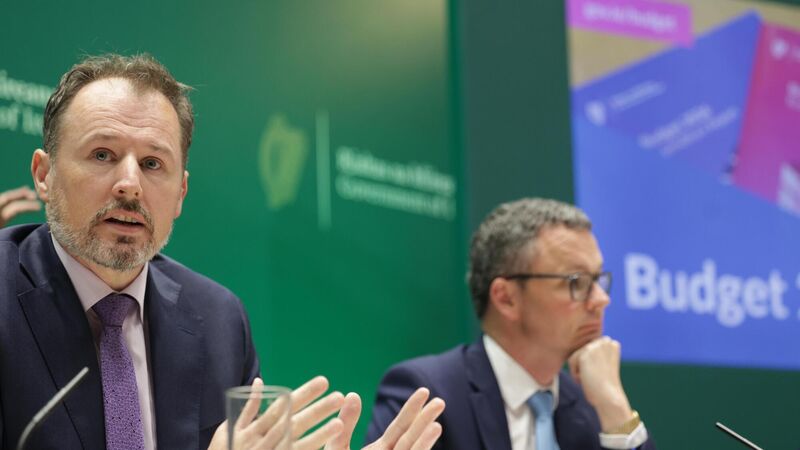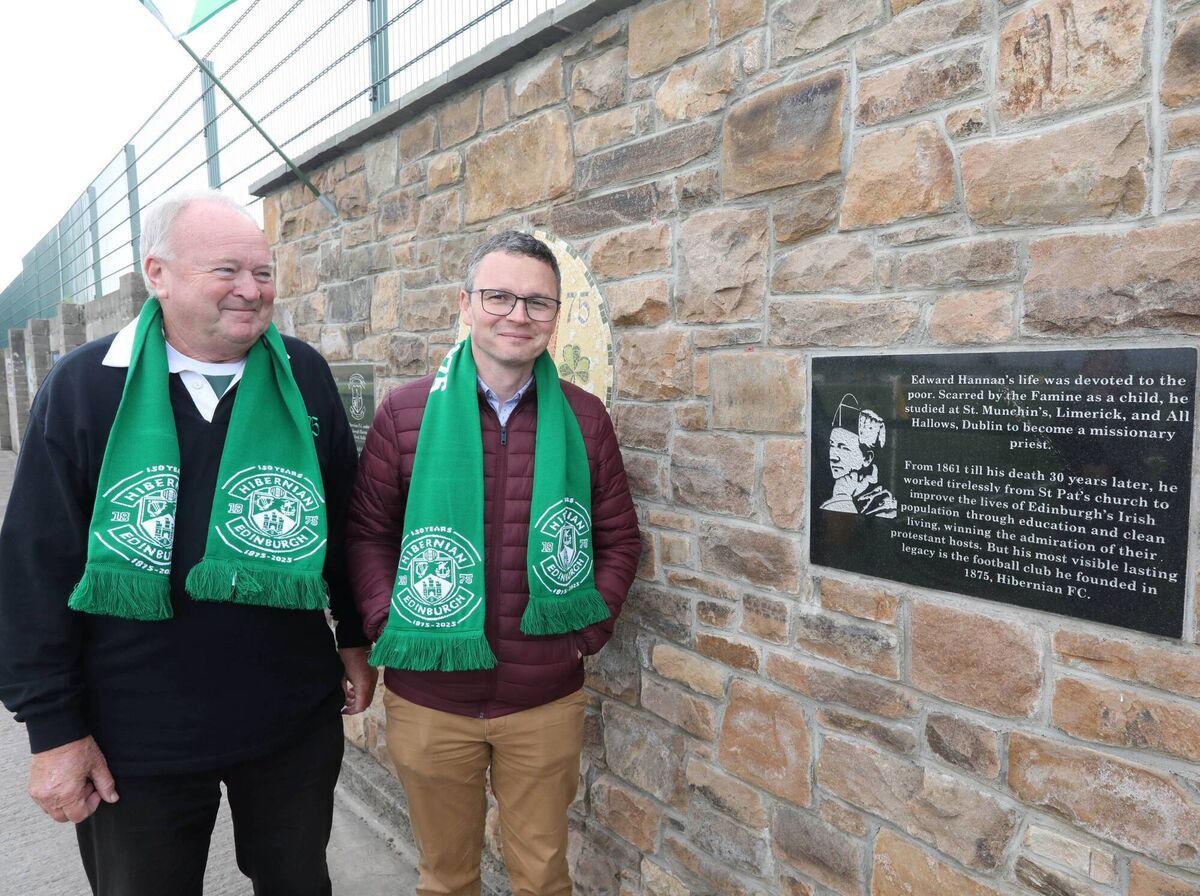John Fallon: How Irish clubs are set to spend academy funding

Minister of State at the Department of Culture, Communications and Sport Charlie McConalogue. Pic: Leah Farrell/© RollingNews.ie
Out of what was derided by critics as the Hamburger Budget, League of Ireland clubs must start getting into the meat of a €3m allocation towards funding academies.
The landscape and argument are worth revisiting for context.
Brexit restricting importation of talent until 18 places the onus on Irish clubs to perform the developmental function traditionally conducted by UK academies.
Bar the odd exception, professional academies don’t exist in Ireland.
The League of Ireland department has quantified the yearly cost of staffing a club-led nationwide programme, for both boys and girls, at €16m.
With half of that amount already in a system operating at variable speed across 26 academies, an €8m shortfall was identified.
That is the ultimate annual amount being sought from the State but to kickstart the ‘industry’ into an envisaged 11-year cycle culminating in self-sustainability, €4.45m was applied for.
This was on the back of the “Programme for Government” from January containing a line item citing “Exploring new mechanisms for the creation of football academies”.
Political promises don’t always translate into reality. There was also the conflation of the FAI’s governance issues with the notion of impacting this distribution to clubs unconnected with the controversy.
That the Joint Oireachtas committee for sport recently highlighted the distinction paved the way for the landmark announcement on October 7.
League of Ireland (not the FAI) were awarded two-thirds of their ask, in the form of €3m.
Moreover, the commitment of multi-annual funding facilitates proper planning. In practical terms, the grants allow each club to recruit two dedicated employees ringfenced for their underage structure.
An academy manager and head of coaching are accounted for; the third vacancy earmarked, an administrator, will have to wait or be paid for separately.
Moves are already afoot for those 50 personnel to be in place for the start of the 2026 season in February.
Minister for State Charlie McConalogue, speaking to , confirmed the declaration in Leinster House has been followed by action.
“I had a meeting with FAI and Sport Ireland on this in the past week,” he explained.
“The first year is the most important because we’ve to get the structure right. Our commitment is recurrent for the foreseeable number of years. The ask to increase that over time will be assessed in future Budgets.
“The key thing is how we step it out to improve contact time for players across the country.”
Specifically, the initial proposal submitted by the League of Ireland must be renosed to reflect the smaller allocation and be signed off at ministerial level.
From there, job specifications for the two roles are to be defined, with standardised criteria applied before pitching to the market.
Job security will determine the quality of the candidate. Twelve-month contracts are less appealing than 36 months for enticing contenders of calibre. Thankfully, the latter is likely.
While Government agency Sport Ireland will have an oversight role in ensuring taxpayers money is dispensed as intended, it will be the League of Ireland coordinating the mechanics.
Grants to fund, or subsidise, the roles will be distributed on a staggered basis.
Some clubs are starting from level zero. Others in a position to do so, especially the Premier Division outfits whose Uefa solidarity payouts rocketed to €356,000 this year, have onboarded staff.
Yet the benchmarking report undertaken by Belgian specialists DoublePass found that less than half (46%) Ireland clubs employ a full-time academy director, compared to 60% of clubs in countries ranked 51-100.
“We want to ensure this money is used for additionality,” added McConalogue.
“It’s not for replacing, displacing or being subsumed. We shouldn’t fall over ourselves to be hasty but will do as promptly as possible to get the right people in.
“I’d expect that we’re well up and running with staffing by the new year.”
Economic conditions, for instance Trump’s Tariffs, will influence exchequer outlay but, crucially, this was generated as a new pot within Sport Ireland’s portfolio.
Political powerbrokers anticipate not only this delivering a pipeline of players to improve the senior Ireland teams but transfer fees to cover expenditure. Indeed, a stipulation will be any player income will have a preordained portion routed into the origins for repeat successes.
“Our intention is for repeat funding but we want it to be self-sustainable,” stressed the minister.
“For example, when footballers come through the system and are sold, those transfer fees help replenish the system. It must be fair and proportionate.
“There’s an acknowledgment at Government level that we’re key stakeholders in investing.
“The objective is to get players to a level of excellence for a high transfer value and international level.
“It will have to be spread for a national programme. Whether a kid is in Galway, Kerry, Donegal or Wexford, you want a pathway that’s accessible.
"Not dependent on being privileged to have parental support to travel – which is the case for a lot of players now.”
November is the month when licenses for the 2026 League of Ireland are dished out and eyes will shortly be on the situation at First Division winners Dundalk.
Ciarán Kilduff delivered in his maiden season in men’s team management by bringing the Lilywhites straight back up to the top-flight.
This time last year, the club’s existence was under threat, leading to a delay in their license being granted.
Although promotion was last week secured, issues around the artificial pitch and floodlights at Oriel Park are outstanding.
A community sports fund grant of €445,000 was awarded to install a new surface and upgrade lights but matched funding is required to complete the projects.
Local barrister John Temple took majority ownership last year and in Monday’s address to fans at the Town End Podcast discussed the financial challenges. It has left Kilduff in limbo when it comes to retaining and recruiting players and staff for their Premier Division return.
“I need to find €120,000 to finish the works,” he said about the facilities upgrade.
“Tenders are out for the pitch and it will take 10 weeks to lay. That must be done to meet Uefa standard. If the lights don’t get finished, we could be playing our home games at 5pm.”
That will bristle the League of Ireland hierarchy. They will again be seeking written assurances on financial commitments for 2026.
Celtic’s Irish roots are well established through its foundation by Sligo-born Brother Walfrid in 1887 but the Limerick influence on the creation of Scottish rivals Hibernian has been chronicled in a new book.
Minister Patrick O’Donovan was present at Ballingarry AFC last week to help launch Edinburgh's First Hibernian: The Mission of Edward Joseph Hannan.
It charts the story of Canon Edward Joseph Hannan, who left Ballingarry at the age of 19 in 1855.

He dedicated his life to improving the conditions for Edinburgh's impoverished Irish immigrant community, co-founding Hibernian FC in 1875 as part of his mission to provide education, exercise, and purpose to young Catholic men living in desperate slum conditions.
Hibs’ director of marketing and brand Scott Souness also attended the launch, outlining the club’s strides to reach their recent 150th anniversary.
It was a visit to Limerick six years ago that inspired author Michael Hennessy to pen the fascinating story of a man who lived on a farm in Ballygrennan, near Ballingarry, before emigrating in his teens.
The tome, published by Thirsty Books, is available in book stores and via Amazon.



